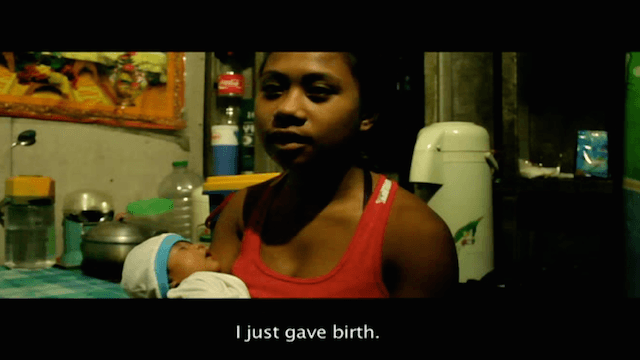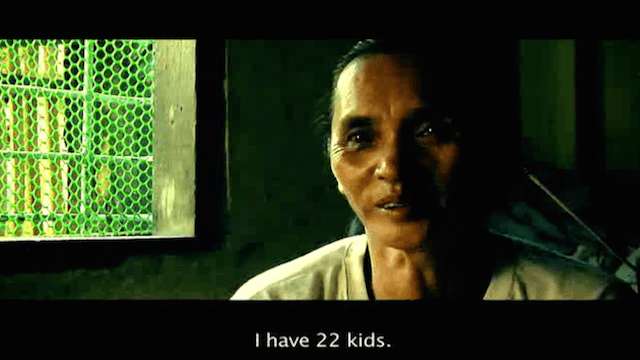SUMMARY
This is AI generated summarization, which may have errors. For context, always refer to the full article.
![[DASH of SAS] Her name is Rosalie and she has 17 children](https://www.rappler.com/tachyon/r3-assets/612F469A6EA84F6BAE882D2B94A4B421/img/1222F9CE8F50472EBC0794ED795A5917/ana-santos-150.png)
MANILA, Philippines – Her name is Rosalie. She has been pregnant 22 times and has 17 children. She had her first child at 16, and as she puts it, “just kept having them.”
She’s quite famous in her neighborhood of Tondo, an urban slum area cited as one of the mostly densely populated on earth. Her story has attracted a number of both foreign and local journalists who come looking for the “woman with many children.”
Rosalie became an inadvertent poster girl for the passage of the Reproductive Health (RH) Bill that took more than a decade to pass.
While Rosalie was certainly a rarity by virtue of sheer number, she was hardly alone. There are many women in Tondo who have “many children.”
If Rosalie is not around, solicitous neighbors will not have difficulty offering other choices and directing journalists to another woman “also with a lot of children.”
“There’s one who has 6 children,” one will say.
“That’s not a lot. There’s one who has 10 children,” will counter another.
“No, no. We should take them to the one with 12 children,” will say yet another.

Laura Jane
Her name is Laura Jane. She dreamed of being a scientist when she grew up. It is not a dream that she liked to talk about – not because she was afraid of being laughed at but because she already knew that her dream would remain just that – a dream, the wish of an overstretched imagination.
Every day she conditioned herself to believe that. It was better than being disappointed.
She lives in the same neighborhood as Rosalie where dreams are a luxury. The reality of grinding poverty is more apparent. (READ: Young, pregnant, and poor)
She became a mother at 15.
It was a self-fulfilling prophecy. Her poverty secured limitations rather opportunities. It was so overpowering that it bred helplessness rather than persistence. (READ: Teenage pregnancies: Untangling cause and effect)
“I once wanted to be a scientist,” she told me when we interviewed her in her little home of boards and other odds and ends sewn together to make four walls and a roof. All around us the wailing of other babies mixed in with the howling of stray dogs.
Her voice trailed off and she didn’t complete her sentence. She just looked down at the newborn she held in her arms.

Jeremy
Her name is Jeremy. She had just given birth to her second child when I met her at a birthing clinic in Malabon.
She was 18-years old.
I asked her if she and her 19-year-old live-in boyfriend were considering family planning. She gave me a blank look. “Hindi po ba pang mag-asawa lang yun?”
(Isn’t that just for married people?)
In our cautiousness, we couch words like “sex” and “birth control” into more socially acceptable but ambiguous terms that have the subtle but real power to exclude.
Safeguarding and extolling our virtues, we have comprised the sexual literacy of young people, leaving them to blindly navigate a minefield where one miscalculation can result in a lifetime of ramifications.
Jonamae and Christian
Her name is Jonamae. His name is Christian.
They wanted to be more than just farmhands in a hacienda, breaking their backs and toiling under the sun to harvest sugarcane. (READ: [Dash of SAS] Health care providers with a heart)
Jonamae wanted to work in a beauty salon filled with colorful palettes of lipstick and eyeshadow. She wanted to be surrounded by pretty things and make women pretty and happy.
Christian wanted to be a seafarer who would sail off to faraway lands and see the world, but he had only finished second grade.
They have a child now. A chance to start over. A chance to give someone a chance at life. They can’t say they were ever robbed of chances – from the beginning, they never had them.
“Ilan po ang gusto nyong anak?” The barangay health worker asked them. (How many children do you want to have?)
They answer at the same time but their answers differ. They laugh softly and give each other a shy sideward glance. They haven’t had that conversation yet. They aren’t sure what birth control options are available or viable.
They need the guidance of the barangay health care worker – these walking talking maternity clinics – to help them plan their families.

Unmet need for birth control
There are an estimated 5.25 million Filipino women who have what is called an “unmet need for contraception” – meaning they need birth control to plan the size and spacing of their families but do not have access to contraceptives. Often, the barrier to access is economic. (READ: #SONA2015: The state of the RH Law)
The RH Law would have guaranteed access to free contraceptives for Filipinos like Rosalie, Laura Jane, Jeremy, and Jonamae and Christian.
They are just some of the millions of Filipinos who depend on free contraceptives provided by the government. They are not promiscuous teenagers ruled by hyperactive hormones rather than rationale. They are people just like you and me.
However, unlike them, my entire reproductive health future – my lifetime – does not depend entirely on the illogical whims, questionable morals and inflated egos of legislators who do not know my name and are arrogantly oblivious to my story.
Senator Pia Cayetano estimates that 24 million women of reproductive age will not have access to reproductive health products because the P1 billion fund allocated for contraceptives was scrapped by Senator Vicente Sotto with the concurrence of Senator Loren Legarda. Four million of them are among the poorest of the poor.
“It means married women who are probably on their fifth pregnancy may then become pregnant this year. Young women who have had two miscarriages and should not get pregnant again might die because they won’t have access to contraceptives. So it goes on and on and that’s millions of women who will be deprived,” said Cayetano.
Millions and millions of women just like Rosalie, Laura Jane, Jeremy and Jonamae.
Bic Bic Chua, executive director of Catholics4RH was enraged and incredulous when she learned of the budget cut. “All these men and women want is help planning their families – is that too much to ask?”
Apparently, for Sotto and Legarda it is. – Rappler.com
“Tondo” film was produced for Sex and Sensibilities and Likhaan Center for Women’s Health to call for the passage of the RH Bill.
Add a comment
How does this make you feel?
There are no comments yet. Add your comment to start the conversation.